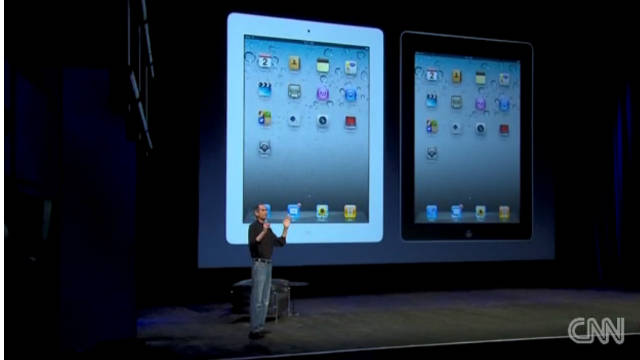Did Steve Jobs kill Adobe Flash?
Did Steve Jobs kill Adobe Flash?

STORY HIGHLIGHTS
- Steve Jobs hated Adobe's Flash, which will quit developing for mobile devices
- The Apple CEO's feud dated to 1999, when Adobe wouldn't develop for the Mac
- He called Flash "buggy;" while Adobe criticized Apple for depriving developers of freedom
- Adobe will now support HTML5, which Apple's mobile devices use
(CNN) -- Steve Jobs hated Flash. Hated it. And not just a little bit.
"Flash is a spaghetti-ball piece of technology that has lousy performance and really bad security problems," he said, according to biographer Walter Isaacson in his book published earlier this month.
On Wednesday, Adobe announced it will no longer be developing Flash, its media-player tool, for mobile devices. More than a few bloggers have noted the news would have been vindication for the late Apple co-founder, who felt betrayed by Adobe more than a decade ago.
In a post on the Adobe blog, company vice-president Danny Winokur said Flash has enabled the Web's richest content for a decade.
"However, HTML5 is now universally supported on major mobile devices, in some cases exclusively," he said, apparently a nod to Apple's iPhone, iPad and iPod. "This makes HTML5 the best solution for creating and deploying content in the browser across mobile platforms."
HTML5 is the emerging Web language that many developers are using.
The Apple vs. Adobe standoff over Flash has been one of the tech world's most visible, and at times nasty, disputes. As the company shifts away from developing software for smartphones and tablets, it is impossible to ignore the part that Apple's steadfast refusal to use Flash on its popular mobile products may have played in the decision.
Under Jobs, who died October 5 after a long battle with cancer, the iPhone became the industry's leading smartphone and the iPad emerged to virtually dominate the tablet space. While there are more phones running Google's Android software (many of them pointedly advertising their Flash compatibility), no products captured the public's imagination, and attention, quite like Apple's.
As such, when Jobs blasted Flash, people listened. And blast it he did.
He called it "buggy," a battery hog and a product created by lazy developers.
"Allowing Flash to be ported across platforms means things get dumbed down to the lowest common denominator," Jobs said, according to Isaacson. "We spend lots of effort to make our platform better and the developer doesn't get any benefit if Adobe only works with functions that every platform has."
Adobe fired back. Last year, the company bought multiplatform ads which, perhaps appropriately, flashed this message: "We love Apple ... . What we don't love is anybody taking away your freedom to choose what you create, how you create it, and what you experience on the Web."
According to the biography, Jobs' longstanding animus toward Adobe helped form his vision for Apple's tightly controlled mobile environment.
In 1999, he was flatly denied when he asked Adobe to create a version of its popular Adobe Premiere digital-graphics software for the Mac. Adobe also wouldn't rewrite Photoshop for the Mac's operating system, even though Macs were popular with designers.
"My primary insight when we were screwed by Adobe in 1999 was that we shouldn't get into any business where we didn't control both the hardware and the software, otherwise we'd get our head handed to us," Jobs said, according to Isaacson.
The two companies go back together even further. Apple invested in Adobe in 1985 and they worked together early on. But Jobs, who in Isaacson's book comes off sometimes as vindictive and brusque as he was innovative and inspirational, told Isaacson that Adobe went downhill after founder John Warnock retired.
"The soul of Adobe disappeared when Warnock left," he said. "He was the inventor, the person I related to. It's been a bunch of suits since then, and the company has turned to crap."
On Wednesday, Adobe said its upcoming release of Flash Player 11.1 for Android and the BlackBerry PlayBook will be the platform's final mobile update.
Moving forward, Winokur said, Adobe plans to work with "key players in the HTML5 community, including Google, Apple, Microsoft and RIM."
http://edition.cnn.com/2011/11/09/tech/mobile/flash-steve-jobs/index.html